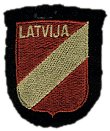24
Was Hazners too busy with paperwork at Annas Street to have inspected the guard detail at the ghetto gate? The conflicting testimony of the witnesses who saw him at the schutzmannschaft headquarters and other clues in the transcript point to the answer. As the respondent noted, few Latvian army officers survived the Russian occupation, (tr. 10311) Of those who did, not all were equally eager to throw in their lot with the Germans. 33/ Consequently, the schutzmannschaft suffered from a shortage of officers, which meant that those who worked at Annas Street did 1double and triple duty. In these circumstances, it is entirely likely that a 2staff officer would be assigned to inspect a detachment of troops to insure that they were implementing the Nazi policy of starving the ghetto. But Hazners would have this court believe that he walked quietly to his office at Annas Street every day in the fall of 1941, and 3sat there from nine to five shuffling papers and showing in visitors. In evaluating his story, this court will recall that Hazners was a young captain with the drive to graduate from the Latvian Military Academy, to go on to the Army Staff school, to survive the Soviet occupation of his country, to serve as Chief of Police in the strategic border district of Abrene and to fight valiantly with the Waffen-SS on the eastern front. Is it conceivable that he 4sat meekly in Veiss's anteroom while the war raged around him?
| 33/ | Parups, for example, testified that an underground movement was formed to resist the German occupation, (tr. 11982) |
Examination
Presenting no German archival evidence regarding Hāzners's service, the INS free to speculate scenarios which would place Hāzners at the ghetto gate. The INS cites nothing to support its fantasy of double and triple duty.
The INS invents convoluted scenarios by which Veiss and Hāzners, having nothing to do with the Holocaust, are implicated in collaborationist units. The INS would have us believe that in addition to duties solely associated with frontier protection and, increasingly, managing units engaged in combat on the Eastern Front, that Hāzners had plenty of time to moonlight with murderers.
Moreover, whatever the organizational boundaries on paper, units on the frontier and front-line were operationally subordinated to the Wehrmacht, meaning Hāzners could not be organizationally "shared" with collaborator units. The INS postulates Holocaust collaboration based on the word "schutzmannschaft," ignoring functional reporting structure and that it was Sicherheitsdienst-aligned units who were the principal collaborationist perpetrators.
The INS's contention is as preposterous as it is transparent, made possible only by the INS avoiding Hāzners documented war record.
The INS ignores its own earlier summary of testimony regarding Hāzners position and duties, derisively picking out the single most innocuous possibility, "showing in visitors."
From Hāzners's own memoir, there was more than enough to keep him busy, whether coordinating long-range with Veiss' men or arguing with the Germans over how they were being deployed. There was plenty of paperwork as well, writing up reports of unit actions, all of which needed to be translated to be forwarded to the Wehrmacht, and so on.
Arguing with commanding officers of the military force occupying your country is hardly "meek." The INS's ridiculing lays bare the very personal nature of its attack on Hāzners.
Perhaps the most disturbing is the INS's historical perspective. It extols Hāzners as a competent, motivated, "valiant" patriot, and contends someone such as he would not be content to meekly sit behind a desk. Therefore we should believe it far more likely he would rather go out to murder his fellow citizens?
The INS's toxic subtext is that "Latvian patriots" and "Nazis" are one and the same.
| 1 | Testimony of Vilis A. Hazners, 8-March-1978, direct, transcript pp. 1019–1059. |
| 2 | Testimony of Eriks Parups, 10-April-1978, direct, transcript pp. 1192–1206. |
